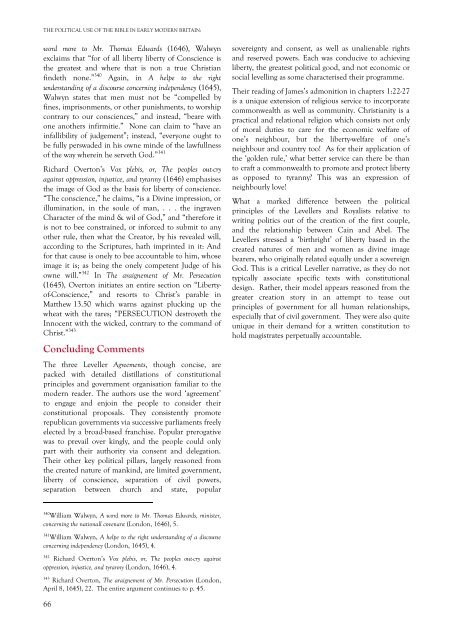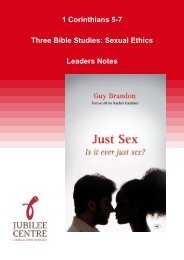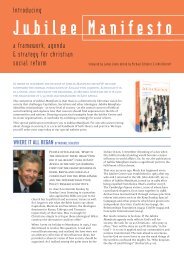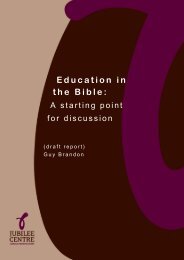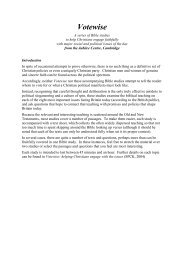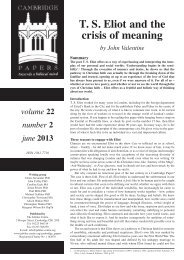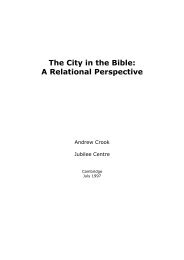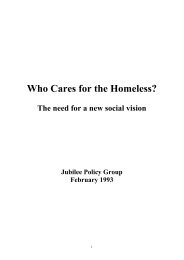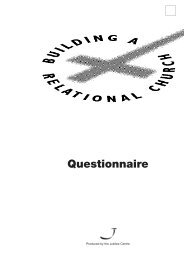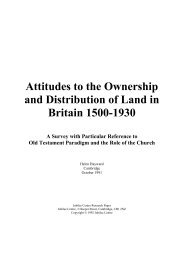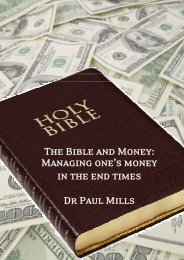Report Template - Jubilee Centre
Report Template - Jubilee Centre
Report Template - Jubilee Centre
Create successful ePaper yourself
Turn your PDF publications into a flip-book with our unique Google optimized e-Paper software.
THE POLITICAL USE OF THE BIBLE IN EARLY MODERN BRITAIN:<br />
word more to Mr. Thomas Edwards (1646), Walwyn<br />
exclaims that “for of all liberty liberty of Conscience is<br />
the greatest and where that is not: a true Christian<br />
findeth none.” 340 Again, in A helpe to the right<br />
understanding of a discourse concerning independency (1645),<br />
Walwyn states that men must not be “compelled by<br />
fines, imprisonments, or other punishments, to worship<br />
contrary to our consciences,” and instead, “beare with<br />
one anothers infirmitie.” None can claim to “have an<br />
infallibility of judgement”; instead, “everyone ought to<br />
be fully perswaded in his owne minde of the lawfullness<br />
of the way wherein he serveth God.” 341<br />
Richard Overton’s Vox plebis, or, The peoples out-cry<br />
against oppression, injustice, and tyranny (1646) emphasises<br />
the image of God as the basis for liberty of conscience.<br />
“The conscience,” he claims, “is a Divine impression, or<br />
illumination, in the soule of man, . . . the ingraven<br />
Character of the mind & wil of God,” and “therefore it<br />
is not to bee constrained, or inforced to submit to any<br />
other rule, then what the Creator, by his revealed will,<br />
according to the Scriptures, hath imprinted in it: And<br />
for that cause is onely to bee accountable to him, whose<br />
image it is; as being the onely competent Judge of his<br />
owne will.” 342 In The araignement of Mr. Persecution<br />
(1645), Overton initiates an entire section on “Libertyof-Conscience,”<br />
and resorts to Christ’s parable in<br />
Matthew 13.50 which warns against plucking up the<br />
wheat with the tares; “PERSECUTION destroyeth the<br />
Innocent with the wicked, contrary to the command of<br />
Christ.” 343<br />
Concluding Comments<br />
The three Leveller Agreements, though concise, are<br />
packed with detailed distillations of constitutional<br />
principles and government organisation familiar to the<br />
modern reader. The authors use the word ‘agreement’<br />
to engage and enjoin the people to consider their<br />
constitutional proposals. They consistently promote<br />
republican governments via successive parliaments freely<br />
elected by a broad-based franchise. Popular prerogative<br />
was to prevail over kingly, and the people could only<br />
part with their authority via consent and delegation.<br />
Their other key political pillars, largely reasoned from<br />
the created nature of mankind, are limited government,<br />
liberty of conscience, separation of civil powers,<br />
separation between church and state, popular<br />
sovereignty and consent, as well as unalienable rights<br />
and reserved powers. Each was conducive to achieving<br />
liberty, the greatest political good, and not economic or<br />
social levelling as some characterised their programme.<br />
Their reading of James’s admonition in chapters 1:22-27<br />
is a unique extension of religious service to incorporate<br />
commonwealth as well as community. Christianity is a<br />
practical and relational religion which consists not only<br />
of moral duties to care for the economic welfare of<br />
one’s neighbour, but the liberty-welfare of one’s<br />
neighbour and country too! As for their application of<br />
the ‘golden rule,’ what better service can there be than<br />
to craft a commonwealth to promote and protect liberty<br />
as opposed to tyranny? This was an expression of<br />
neighbourly love!<br />
What a marked difference between the political<br />
principles of the Levellers and Royalists relative to<br />
writing politics out of the creation of the first couple,<br />
and the relationship between Cain and Abel. The<br />
Levellers stressed a ‘birthright’ of liberty based in the<br />
created natures of men and women as divine image<br />
bearers, who originally related equally under a sovereign<br />
God. This is a critical Leveller narrative, as they do not<br />
typically associate specific texts with constitutional<br />
design. Rather, their model appears reasoned from the<br />
greater creation story in an attempt to tease out<br />
principles of government for all human relationships,<br />
especially that of civil government. They were also quite<br />
unique in their demand for a written constitution to<br />
hold magistrates perpetually accountable.<br />
340 William Walwyn, A word more to Mr. Thomas Edwards, minister,<br />
concerning the nationall covenant (London, 1646), 5.<br />
341 William Walwyn, A helpe to the right understanding of a discourse<br />
concerning independency (London, 1645), 4.<br />
342<br />
Richard Overton’s Vox plebis, or, The peoples out-cry against<br />
oppression, injustice, and tyranny (London, 1646), 4.<br />
343<br />
Richard Overton, The araignement of Mr. Persecution (London,<br />
April 8, 1645), 22. The entire argument continues to p. 45.<br />
66


